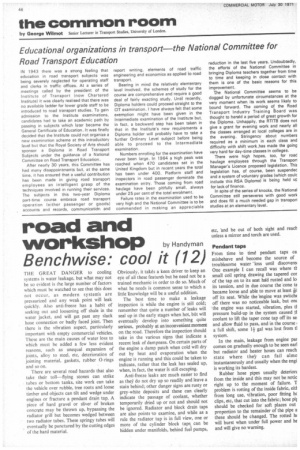IN 1943 there was a strong feeling that education in
Page 48

If you've noticed an error in this article please click here to report it so we can fix it.
road transport subjects was being severely neglected for operating staff and clerks in traffic offices. At a series of meetings called by the president of the Institute of Transport (now Chartered Institute) it was clearly realised that there was no available ladder for lower grade staff to be introduced to road transport studies. To gain admission to the Institute examinations, candidates had to take an academic path by passing in subjects which later became the General Certificate of Education. It was finally decided that the Institute could not organize a new examination scheme at this introductory level but that the Royal Society of Arts should sponsor a Diploma in Road Transport Subjects under the guidance of a National Committee on Road Transport Education.
After nearly 30 years, this Committee has had many disappointments but, at the same time, it has ensured that a useful contribution has been made in giving road transport employees an intelligent grasp of the techniques involved in running their services. The subjects in this two-year Diploma part-time course embrace road transport operation (either passenger or goods) accounts and records, communication and report writing, elements of road traffic engineering and economics as applied to road transport.
Bearing in mind the relatively elern'entary level involved, the schemes of study for the course are comprehensive and require a good deal of fairly exacting study. Until recently, Diploma holders could proceed straight to the CIT examination. I have always felt that some exemption might have been given in the Intermediate examination of the Institute but, in fact, a backward step has been taken in that in the Institute's new requirements a Diploma holder will probably have to take a further Ordinary Level subject before being able to proceed to the Intermediate examination.
Numbers enrolling for the examination have never been large, In 1964 a high peak was reached when 470 candidates sat in the United Kingdom but in recent years the total has been under 400. Platform staff and inspectors in road passenger dominate the examination entry. Those coming from road haulage have been pitifully small, always under 25 per cent of the total enrolment.
Failure rates in the examination used to be very high and the National Committee is to be commended in making an appreciable
reduction in the lest five years. Undoubtedly, the efforts of the National Committee in bringing Diploma teachers together from time to time and keeping in close contact with them is one of the basic reasons for this improvement,
The National Committee seems to be dogged by unfortunate circumstances at the very moment when its work seems likely to bound forward. The coming of the Road Transport Industry Training board was thought to herald a period of great growth for the Diploma. Unhappily, the RTITB does not give a grant for evening work and nearly all the classes arranged at local colleges are in the evening. Stringency about numbers required as a minimum in each class and difficulty with shift work ,has made the going very hard for day-time classes in colleges.
There were high hopes, too, for road haulage employees through the Transport Manager's Licence proposed legislation. This legislation has, of course, been suspendec and a system of voluntary grades (which coulc include this RSA Diploma) is being held up for lack of finance.
In spite of the series of knocks, the National Committee still perseveres with good work and does fill a much needed gap in transport studies at an elementary level.




















































































